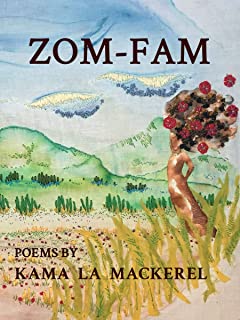Kama La Mackerel is a Mauritian-Canadian multi-disciplinary artist, educator, writer and literary translator based in Montreal. La Mackerel earned a Bachelor in Literature and Cultural Studies at the University of Pune, India, and a Masters degree in Theory, Culture and Politics at Trent University in Peterborough, Ontario. Training in contemporary dance and Kathak as well as physical theatre informs their performance art.
On their personal website, they describe their hybrid identity thus:
“Kama was born in Mauritius, in mixed-race Kréol (Afro-Mauritian) and Malbar (Indo-Mauritian) family, descendant of Slaves and indentured labour on the plantation island. Growing up at the interstice of two ethnicities, two religions (Catholicism and Hinduism) and three languages (Kréol, French and English), having lived in Hindi and Tamil, and being a “zom-fam,” (i.e. man-woman or transgender), Kama occupies multiple hybrid spaces, journeying across bodies, lands, cultures and languages, seeking a place to call home.”

Poetry
Zom-Fam: Poems
Monreal: Metonymy Press, 2020.
Publisher’s Synopsis (From its website)
Ma misses the sun, warmth and colors of their faraway homeland, but her daughter sees magic in everything — the clouds in the winter sky, the “firework” display when she throws an armful of snow into the air, making snow angels, tasting snowflakes. And in the end, her joy is contagious. Home is where family is, after all.
In their debut poetry collection, Kama La Mackerel mythologizes a queer/trans narrative of and for their home island, Mauritius. Composed of expansive lyric poems, ZOM-FAM (meaning “man-woman” or “transgender” in Mauritian Kreol) is a voyage into the coming of age of a gender-creative child growing up in the 80s and 90s on the plantation island, as they seek vocabularies for loving and honouring their queer/trans self amidst the legacy of colonial silences. Multiply voiced and imbued with complex storytelling, ZOM-FAM showcases a fluid narrative that summons ancestral voices, femme tongues, broken colonial languages, and a tender queer subjectivity, all of which grapple with the legacy of plantation servitude.